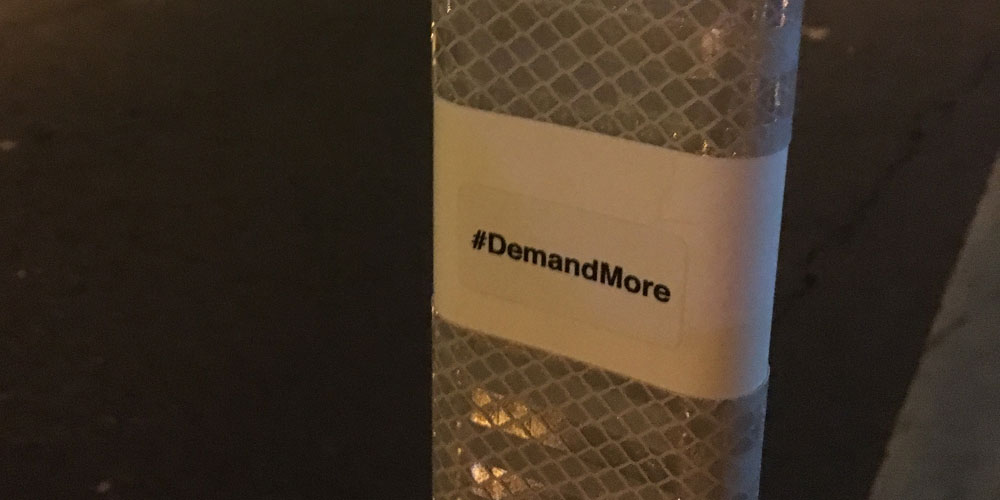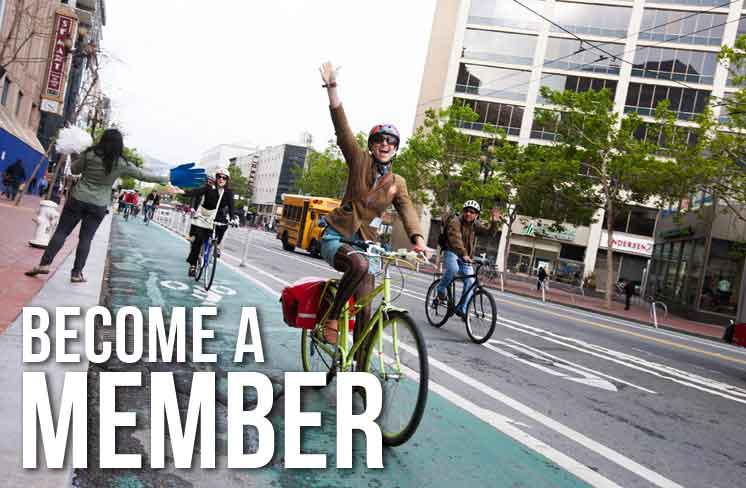I came upon them like something out of a dream: plastic posts on Folsom at Division Street, reflecting in the night and keeping a stretch of bike lane clear that was all-too-frequently blocked by illegally parked cars and trucks.
Was the City finally making an effort to improve a stretch of bike lane that had long been a source of frustration for me and other people who bike in SF? I stopped and took a closer look: #DemandMore the posts said. They were the work of those masked avengers at the SF Municipal Transformation Agency. I should have known better.
Those posts are now gone, and Folsom Street remains a harrowing and less-than-ideal place for people who bike. I live in Western SoMa not far from the temporary installation on Folsom. Every day my partner and I leave our apartment on our bikes we feel the impact of unsafe streets viscerally. Auto traffic speeds to and from freeway onramps and offramps down five lane, one-way streets. Things could be so much better.
I know our members agree with me. Nearly 500 of you responded to our survey, and several dozen have participated in workshops and shown up to outreach meetings as part of our SoMa Member Committee. We want physically protected bike lanes and intersections. We want smart, data-driven enforcement of speed limits. And we wanted them yesterday.
Biking in SoMa—and in every neighborhood across San Francisco—is far from what it could be. If the City doesn’t have a clear vision for what that could look like (and it’s more apparent than ever that they don’t), it’s our job to advance one: concrete medians and planters separating bikes from pedestrians and auto traffic; one-way traffic sewers converted to two-way neighborhood streets; bike and pedestrian signals with lead timing before the green for autos; and bulbouts and raised crosswalks that reduce speeds.
These aren’t fantasies. They are proven treatments that save lives and encourage more people to bike. And they are being installed on streets in other American cities at a rate that should embarrass our City government.
So far in this job I have heard a lot of excuses from City leaders about why they can’t deliver projects faster. One of them is always resources. While the culture of delay that pervades City agencies should never be permitted, it’s true that construction projects like those I just described cost money. We need to take that excuse away from them.
That’s why the SF Bicycle Coalition is working so hard to pass Propositions J&K. It’s always an uphill battle when you ask people to raise taxes, but Propositions J&K would enact a modest, ¾-cent sales tax increase that would bring real improvements to the lives of San Franciscans for decades to come. In addition to crucial funding for homeless services such as new navigation centers and real housing solutions, Propositions J&K would guarantee funding for affordable access to Muni, street repaving and over $10 million a year for the kind of complete street projects that San Franciscans are demanding for our neighborhoods. If you can help us make the case to your friends and neighbors in the last week before Election Day, please sign up to volunteer today.
We have a vision for a real network of protected bike lanes across our city. We have the passion and commitment of our members behind it, and we need that enthusiasm to show up to the polls next week. Beyond Nov. 8, the SF Bicycle Coalition will continue to show up, day after day, and fight for a city where we don’t need ordinary individuals taking matters into their own hands out of frustration in the face of delay and inaction.
In the meantime, and until our vision is fully realized, I will share this note of gratitude to the anonymous folks behind SFMTrA: thank you for the temporary sanity you are bringing to our streets. It is helping build the urgent case for permanent solutions.
Volunteer to help pass Propositions J&K and add your voice to the SFMTrA’s call for a safe Folsom Street.


